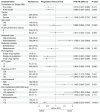The role of immunochemotherapy maintenance in metastatic nasopharyngeal carcinoma: insights from a cohort study in an endemic region
- PMID: 40612410
- PMCID: PMC12221811
- DOI: 10.1002/cti2.70043
The role of immunochemotherapy maintenance in metastatic nasopharyngeal carcinoma: insights from a cohort study in an endemic region
Abstract
Objectives: Metastatic nasopharyngeal carcinoma (mNPC) following palliative chemotherapy has high incidence and mortality rates. While maintenance therapy shows promising potential, the optimal strategy remains undefined. This study aimed to evaluate the therapeutic efficacy of immunochemotherapy maintenance in patients with mNPC.
Methods: This cohort study evaluated the therapeutic efficacy of combined maintenance therapy with capecitabine and anti-PD-1 antibodies in mNPC patients, using a prospectively maintained database. The primary endpoint was progression-free survival (PFS), and secondary endpoints included overall survival and safety profile. Furthermore, stratification analysis and sensitivity analysis were performed.
Results: The study included 300 mNPC patients treated at Sun Yat-sen University Cancer Center from 2018 to 2023. Two hundred and thirty-four patients (78.0%) were male, and the median age was 45 years [interquartile range (IQR): 36-54]. At median follow-up of 43.6 months (IQR: 31.8-57.8), combination maintenance significantly improved PFS compared to single-drug maintenance [weighted hazard ratio (HR) 0.580, 95% confidence interval (95% CI) 0.387-0.872, P = 0.009; E-value, 2.27]. Stratification analysis revealed enhanced efficacy of immunochemotherapy maintenance in patients without prior local treatment (HR 0.414, 95% CI 0.224-0.767, P = 0.005) or with elevated premaintenance Epstein-Barr virus (EBV) DNA levels (HR 0.063, 95% CI 0.007-0.548, P = 0.012). No significant difference in PFS was observed between the capecitabine and anti-PD-1 single-agent groups. Notably, combination therapy yielded significantly longer PFS than either single-drug regimen. The safety profile was similar between combination maintenance and single-drug groups.
Conclusions: Combined maintenance therapy with anti-PD-1 antibodies and capecitabine may be a feasible treatment strategy for mNPC patients.
Keywords: adjuvant drug therapy; combined modality therapy; metastasis; nasopharyngeal carcinoma.
© 2025 The Author(s). Clinical & Translational Immunology published by John Wiley & Sons Australia, Ltd on behalf of Australian and New Zealand Society for Immunology, Inc.
Conflict of interest statement
The authors declare no conflict of interest.
Figures




Similar articles
-
Anti-PD-1 antibody with or without capecitabine as maintenance therapy after first-line therapy of recurrent or metastatic nasopharyngeal carcinoma.Oncologist. 2025 Jul 4;30(7):oyaf188. doi: 10.1093/oncolo/oyaf188. Oncologist. 2025. PMID: 40577355 Free PMC article.
-
The effectiveness and cost-effectiveness of carmustine implants and temozolomide for the treatment of newly diagnosed high-grade glioma: a systematic review and economic evaluation.Health Technol Assess. 2007 Nov;11(45):iii-iv, ix-221. doi: 10.3310/hta11450. Health Technol Assess. 2007. PMID: 17999840
-
Treatment options for progression or recurrence of glioblastoma: a network meta-analysis.Cochrane Database Syst Rev. 2021 May 4;5(1):CD013579. doi: 10.1002/14651858.CD013579.pub2. Cochrane Database Syst Rev. 2021. PMID: 34559423 Free PMC article.
-
Optimisation of chemotherapy and radiotherapy for untreated Hodgkin lymphoma patients with respect to second malignant neoplasms, overall and progression-free survival: individual participant data analysis.Cochrane Database Syst Rev. 2017 Sep 13;9(9):CD008814. doi: 10.1002/14651858.CD008814.pub2. Cochrane Database Syst Rev. 2017. PMID: 28901021 Free PMC article.
-
Systemic pharmacological treatments for chronic plaque psoriasis: a network meta-analysis.Cochrane Database Syst Rev. 2021 Apr 19;4(4):CD011535. doi: 10.1002/14651858.CD011535.pub4. Cochrane Database Syst Rev. 2021. Update in: Cochrane Database Syst Rev. 2022 May 23;5:CD011535. doi: 10.1002/14651858.CD011535.pub5. PMID: 33871055 Free PMC article. Updated.
References
-
- Bray F, Laversanne M, Sung H et al. Global cancer statistics 2022: GLOBOCAN estimates of incidence and mortality worldwide for 36 cancers in 185 countries. CA Cancer J Clin 2024; 74: 229–263. - PubMed
-
- Sun XS, Liu SL, Luo MJ et al. The association between the development of radiation therapy, image technology, and chemotherapy, and the survival of patients with nasopharyngeal carcinoma: A cohort study from 1990 to 2012. Int J Radiat Oncol Biol Phys 2019; 105: 581–590. - PubMed
-
- Wong KCW, Hui EP, Lo K‐W et al. Nasopharyngeal carcinoma: An evolving paradigm. Nat Rev Clin Oncol 2021; 18: 679–695. - PubMed
-
- Chen Y‐P, Chan ATC, Le Q‐T, Blanchard P, Sun Y, Ma J. Nasopharyngeal carcinoma. Lancet 2019; 394: 64–80. - PubMed
-
- Zhang L, Huang Y, Hong S et al. Gemcitabine plus cisplatin versus fluorouracil plus cisplatin in recurrent or metastatic nasopharyngeal carcinoma: A multicentre, randomised, open‐label, phase 3 trial. Lancet 2016; 388: 1883–1892. - PubMed
LinkOut - more resources
Full Text Sources
